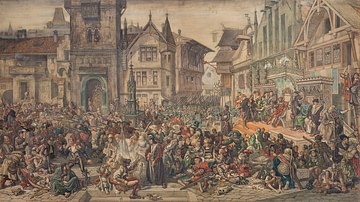Search
Search Results

Definition
Alien and Sedition Acts
The Alien and Sedition Acts were four laws passed by President John Adams and the Federalist-controlled Congress in 1798 that restricted immigration and free speech in the United States. Framed by the Federalist Party as a necessary measure...

Definition
Europe
Europe is a continent forming the westernmost part of the land mass of Eurasia and comprised of 49 sovereign states. Its name may come from the Greek myth of Europa, but human habitation of the region predates that tale, going back over 150,000...

Article
Paper in Ancient China
The widespread use of paper and printing were features of ancient China which distinguished it from other ancient cultures. Traditionally, paper was invented in the early 2nd century CE, but there is evidence it was much earlier. As a cheaper...

Article
Christianity in Japan
Christianity arrived in Japan in 1549 when Jesuits first set foot in Kagoshima. Initial attempts to spread the religion were met with confusion; however, through employing various methods, they began to see success. However, by 1650, Christianity...

Article
Blaurock's Origin of the Anabaptists
George Blaurock (l. c. 1491-1529) was one of the three founders of the Swiss Brethren (known by their opponents as Anabaptists) along with Conrad Grebel (l. c. 1498-1526) and Felix Manz (l. c. 1498-1527). His Origin of the Anabaptists is...

Definition
Goryeo
Goryeo (Koryo) ruled Korea from 918 to 1392. The kingdom oversaw an unprecedented flourishing in culture and arts with developments in architecture, ceramics, printing, and papermaking. The kingdom was repeatedly invaded by the Mongols in...

Definition
Sejong the Great
King Sejong the Great (15 May 1397 to 8 April 1450 CE) ruled Korea from 1418 to 1450 CE as the fourth king of the Joseon Dynasty (also spelled Choson). One of only two Korean kings called 'the Great' today, Sejong had a major impact on Korea...

Definition
Ihara Saikaku
Ihara Saikaku (1642-1693) was a Japanese poet and novelist who played a leading role in creating the so-called ‘floating world’ (ukiyo-zoshi) genre of popular literature in the 17th century. His work was significant because, in terms of both...

Definition
Medieval Literature
Medieval literature is defined broadly as any work written in Latin or the vernacular between c. 476-1500, including philosophy, religious treatises, legal texts, as well as works of the imagination. More narrowly, however, the term applies...

Definition
Diet of Worms
The Diet of Worms (January-May 1521) was the assembly convened by Charles V, Holy Roman Emperor to address, among other issues, the works of the reformer Martin Luther (l. 1483-1546) who openly criticized the Church. Luther was told to recant...